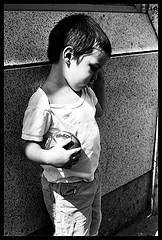“Loss” – The “L” Word

By: Jane Samuel
Driving to school this morning my youngest (chronological age 11, emotional age – always open for debate) and I were discussing her father’s upcoming business trip to Asia. Pulling up to a stoplight, I glanced sideways and did a quick check of her demeanor. While she has gotten much better in the past few years about family members coming and going in her life, I still try to be on the lookout for signs that an upcoming loss – albeit a temporary one – might flip her internal emotional balance on its end. “Trigger her” as we say in the therapeutic parenting business.
Abandoned
By: Jane Samuel
I knew the minute my husband pulled out of the lot and darted across the street to drop me at the pharmacy that it was a bad idea. Our youngest had run back into the retirement home where my father lived to retrieve a forgotten item and my husband thought it would be quicker to pull across, drop me, and run back and get her while I shopped. Problem is he didn’t tell her. He just figured he could get back before she noticed. Wrong.
Resilience – Inborn or Learned – Part 1
By: Julie Beem
There’s a lot of talk about resilience being the antidote to trauma. Lots of workshops, books, and training programs talk about building resilience in kids as a way to counteract the impact of trauma in their lives. On the surface all this seems to make sense, but it’s always puzzled me. What did people mean by resilience, and why does it appear that my child has none, even after years of parenting her?
Go Big: Self Care to the Tenth Degree
By: Gari Lister
What is a good mom? Here’s how I would answer a questionnaire on how I was a good mom today: I drove my ten year old an hour and twenty minutes each way to skating camp; I tried really really hard to talk to my twelve year old about sensitive pre-teen things I cannot share here; I fed my kids mostly healthy gluten free meals; my house is reasonably clean; I taught my middle daughter how to complete a job successfully; I gave the girls all kinds of brain-strengthening vitamins; and I went to yoga. Ok, maybe I wouldn’t include the last item. But maybe I should.
What’s in a Name? Part 4 – Is Keeping a Wrong Label OK?
By: Julie Beem
Many of the parents who contact ATN have children with multiple diagnoses and we’re frequently puzzled about which ones are the “right” ones. I’m included in that group. My child has an alphabet soup of diagnoses, including autism spectrum and ADHD/OCD/Tourettes (aggravated by her trauma.) Fortunately for us, we had professionals who also recognized the RAD, PTSD, DTD components and pointed us in the right directions for treatment of those. Yet, her developmental and processing struggles continue.
What’s in a Name? Part 3 – Misdiagnoses/Misunderstandings
By: Julie Beem
My child has __________________ (pick one or several: Bipolar, ADHD, autism, ODD, anxiety, executive functioning problems). When parents of traumatized children turn to professionals for diagnoses and treatment, coming away with at RAD or Developmental Trauma Disorder diagnosis isn’t a sure thing. If I had a dollar for every time a parent told me, “but my child has only been diagnosed with ADHD,” I could fund ATN’s activities well into the next decade. Nearly every child I’ve met with attachment or trauma problems carries an ADD or ADHD diagnosis. Don’t misunderstand me, children can have both attachment & trauma problems and ADHD. But do they always co-exist? No
What’s in a Name? Part 2 – To Label or Not to Label
By: Julie Beem
“You don’t want her labeled for life.” This sentence is usually spoken by your child’s grandparent (out of sheer concern for you and your family) or by a school official (who may be trying to block access to special education services). Either way, crossing the threshold into “labeling” your child is a difficult thing for many.
This Ain’t My Mama’s Broken Heart
By: Gari Lister
Four years ago today — May 17, 2009 – my 17 year old daughter broke my heart and changed my life forever. She packed a bag, told her little sister not to tell us, and ran away from home with a boy she’d met a handful of times – a boy who murdered two people within a few months (literally). I didn’t realize what a pivotal moment it was right away; I thought it was just another episode in a series of Katya crises.
BMITW
By: Jane Samuel
Last week I took our middle daughter out of town for four days to attend her close friend’s confirmation – in another country. Despite all her healing I still worried this trip would be too hard on our youngest – now ten-years-old and adopted at one. Luckily for her – and I – she was naïve as to how far away I would be (a long plane flight) and only knew I would be back in “four sleeps.”
Mother’s Day – Batten Down The Hatches!
By: Julie Beem
It’s nearly Mother’s Day. And thanks to retailers, schools, churches, we hear the message of “celebrating your mom” broadcasted from the rooftops. In a normal world, this would be a great thing. Motherhood is truly one of the highest callings. But what about children for whom their first relationship with a mother didn’t go well, didn’t last, produced trauma?